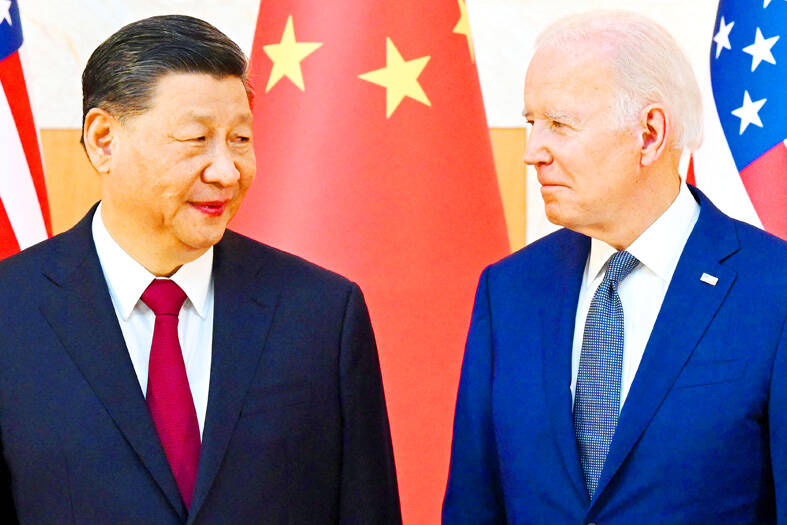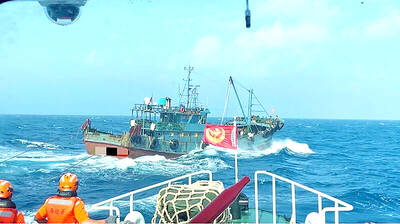The administration of US President Joe Biden has proposed a budget asking for billions more dollars to boost its Indo-Pacific military command, enhance missile defense and strengthen regional economies, as part of a broader push to counter China’s more assertive role in the region.
The White House is proposing US$9.1 billion for Pentagon investments in the Indo-Pacific region as part of the Pacific Deterrence Initiative, up from a US$6.1 billion request for this year. In the end, the US Congress appropriated US$11.5 billion for this year, suggesting that the initiative could get more than it asked for this time also.
Separately, the US Indo-Pacific Command this week in a congressionally mandated report listed the categories of Pentagon spending in which it wants increased funding. It listed US$15.3 billion in needs, up from the US$9 billion it recommended last year.

Photo: AFP
The command wants to boost its arsenal for a potential China fight with underwater mines nicknamed Hammerhead and Quick Strike, and ground-launched Tomahawk cruise missiles that could be fired against Chinese ships.
Its wish list includes billions of dollars for missile defense in Guam and Hawaii, as well as broader missile-warning systems. Overall, the command recommended US$86.8 billion in those areas to shore up US defenses and military presence in the region over the next four years. Last year’s four-year recommendation totaled US$67 billion.
The emphasis on funneling more money to US military assets in the Indo-Pacific highlights how much the Biden administration wants to reorient its defense posture to respond to China’s growing military and economic might.
The administration is demonstrating that commitment with a pledge to sell Australia some of its Virginia-class submarines, part of a move to bolster an alliance that includes the UK.
Biden is set to unveil the agreement in a meeting with the prime ministers of Australia and the UK in San Diego on Monday.
US intelligence chiefs told a US House of Representatives hearing on Thursday that China does not want a military conflict over Taiwan, but remains determined to bring the independently governed island under its control.
The US must not “underestimate the ambitions of the current Chinese leadership in that regard, or their determination” to achieve unification with Taiwan, CIA Director William Burns said.
Meanwhile, the US Department of State is seeking US$2 billion to strengthen Indo-Pacific economies and a further US$2 billion to go toward strategic infrastructure projects — a move likely aimed at countering China’s long-running Belt and Road Initiative, which has built roads, ports and power plants from Pakistan to Sri Lanka.
US Secretary of State Antony Blinken made no secret of the intended target. He said it was a move to “out-compete the People’s Republic of China” and strengthen the US presence in the region.
The Indo-Pacific Command recommends US$172 million in continued development and procurement for the Hammerhead, a weapon it describes as “an offensive mining system” that would be delivered by a drone to “detect, classify and destroy submarines threats.”
The command also highlighted the potential to attack China’s surface vessels with Quickstrike air-launched sea mines developed by Boeing Co, which could hit water and seek out surface targets. The command recommends lawmakers shift US$142 million into that program.
China has the world’s largest navy, with 340 surface ships and submarines. It operates six Jin-class submarines carrying nuclear-tipped intercontinental ballistic missiles, six nuclear-powered attack submarines and 44 diesel-powered attack subs. The US has fewer than 300 vessels.

POLITICAL AGENDA: Beijing’s cross-strait Mid-Autumn Festival events are part of a ‘cultural united front’ aimed at promoting unification with Taiwan, academics said Local authorities in China have been inviting Taiwanese to participate in cross-strait Mid-Autumn Festival celebrations centered around ideals of “family and nation,” a move Taiwanese academics said politicizes the holiday to promote the idea of “one family” across the Taiwan Strait. Sources said that China’s Fujian Provincial Government is organizing about 20 cross-strait-themed events in cities including Quanzhou, Nanping, Sanming and Zhangzhou. In Zhangzhou, a festival scheduled for Wednesday is to showcase Minnan-language songs and budaixi (布袋戲) glove puppetry to highlight cultural similarities between Taiwan and the region. Elsewhere, Jiangsu Province is hosting more than 10 similar celebrations in Taizhou, Changzhou, Suzhou,

The Republic of China (ROC) is celebrating its 114th Double Ten National Day today, featuring military parades and a variety of performances and speeches in front of the Presidential Office in Taipei. The Taiwan Taiko Association opened the celebrations with a 100-drummer performance, including young percussionists. As per tradition, an air force Mirage 2000 fighter jet flew over the Presidential Office as a part of the performance. The Honor Guards of the ROC and its marching band also heralded in a military parade. Students from Taichung's Shin Min High School then followed with a colorful performance using floral imagery to represent Taiwan's alternate name

COGNITIVE WARFARE: Chinese fishing boats transmitting fake identification signals are meant to test Taiwan’s responses to different kinds of perceived incursions, a report said Chinese vessels are transmitting fake signals in Taiwan’s waters as a form of cognitive warfare, testing Taipei’s responses to various types of incursions, a report by the Institute for the Study of War said on Friday. Several Chinese fishing vessels transmitted fake automatic identification system (AIS) signals in Taiwan’s waters last month, with one mimicking a Russian warship and another impersonating a Chinese law enforcement vessel, the report said. Citing data from Starboard Maritime Intelligence, the report said that throughout August and last month, the Chinese fishing boat Minshiyu 06718 (閩獅漁06718) sailed through the Taiwan Strait while intermittently transmitting its own AIS

CHINESE INFILTRATION: Medical logistics is a lifeline during wartime and the reported CCP links of a major logistics company present a national security threat, an expert said The government would bolster its security check system to prevent China from infiltrating the nation’s medical cold chain, a national security official said yesterday. The official, who wished to stay anonymous, made the remarks after the Chinese-language magazine Mirror Media (鏡周刊) reported that Pharma Logistics (嘉里醫藥物流) is in charge of the medical logistics of about half of the nation’s major hospitals, including National Taiwan University Hospital and Taipei Veterans General Hospital. The company’s parent, Kerry TJ Logistics Co (嘉里大榮物流), is associated with the National Committee of the Chinese People’s Political Consultative Conference (CPPCC) and the Chinese People’s Liberation Army (PLA), the